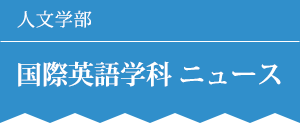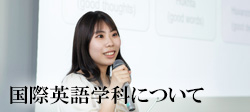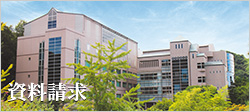In the next in a series of reports from recent HJU graduates, we hear from MT. As with previous reports, she has some good tips and interesting information about her work, and about how to approach university life.
(GSE生の卒業後の活躍を紹介する記事の第三弾です。今回も卒業後の社会人としての仕事の様子に加え、大学在学中の生活について教えてもらいます。)
First, I asked MT about her early times at HJU, especially what motivated her to study English, and what her early challenges were with improving her TOEIC score specifically.
(今回話を聞くM.T.さんには、まず大学入学後の学生生活、特に英語の勉強、TOEICのスコアUPのために努力したことを尋ねました。)
I wanted to speak with the teachers from the United Kingdom and the United States! With that in mind, I searched for every opportunity I could find to use English in my life in Japan. For example, you can make sure you connect to English every day, study independently beyond your assigned work, find people online to practice conversation in English with, and even travel abroad by yourself. I determined to do as much as possible. When preparing for the first TOEIC test, I focused on listening for 30 minutes each day, for 3 months. I managed to push my score up from 445 to 495 through this first period.
(アメリカ人とイギリス人の先生と話したい!という思いから日本で英語を使う機会をたくさん探しました。毎日英語に触れたり、出された課題以上のことをしたり、オンライン英会話を始めたり、1人で海外旅行に出かけたり。出来ることは何でもしました。TOEICの時期は点数を上げるために3ヶ月間毎日TOEICのリスニングを30分聞き流していました。すると短期間で点数が445点から495点になりました。)
Next, I asked MT about her ideas on how university students should approach general university life.
(次に、英語以外の大学生ならではの活動についても話してくれました。)
I met the people I wanted to meet, and I did the things I wanted to do. For example, I helped organize a workshop in which a student I met in Osaka who had started an NPO took part, and to which we invited classmates. I often visited Osaka and Tokyo to ensure I got information from broad sources and thought hard about what problems there were, and who was doing what to try and solve them. I think students should remember that only they have the power to do things for themselves.
(会いたいと思った人に会いにいく、やりたいと思ったことは全てやることを心掛けていました。大阪で知り合った、大学在学中にNPOを立ち上げた学生を広島に呼び、同級生を招きワークショップを開催したこともあります。地方の学生の情報格差を埋めるため頻繁に大阪、東京に出向き、今日本は何が問題でどんな人がどんな事をしているのかを必死に自分から掴みに行っていました。行動力だけは人一倍あります。)
Next, MT talks abext, MT talks about how she is using Engout how she is using Enlish in her current work.
(さて、次は現在の仕事について教えてもらいます。)
Right now, I am working at a High School. However, at the same time, I am distance learning to get a teaching license. Although I won't start formal teaching for a couple of years, I am scoring English tests and proctoring. Other teachers often ask me questions about English, and I often refer to overseas and GSE classes that I took when I was a student at HJU.
(私は今高校で働いています。教員免許を取得するために通信制の大学にも入学しました。実際に授業するのは2年後になりますが、英語のテストの採点や試験監督などをしています。英語の質問などがあると他の先生達からよく質問されます。在学中に行った海外のことやGSEの授業ことをよく聞かれます。)

MT hosts an event for freshman, her English skills have been valuable for her in finding a job she loves.
Finally, I asked MT to give some advice to current and future university students about university life. I think she has some really important points:
(最後に高校生と大学生に大学生活に関するアドヴァイスをもらいます。非常に重要なことを教えてくれました。)
Now that I am in the world of work, I realize that my time at university was the freest in my life. When we are working, we have to be careful not to make any mistakes. When I was a student, I had much more autonomy without fear of consequences. I recommend that you experience a wide variety of things, and to venture outside of Japan when you can, as this will enrich your life.
(社会人になって思うことは、大学生の時は何をしでも許されて人生の中で1番自由な時間があったということ。社会人は少しのミスも許されません。誰からも怒られずに何をしても許される学生時代。たくさん色々な事に触れて日本を飛び出し、自分の人生を豊かにしていって欲しいと思います。)
Well, those are wise words from MT. I want to offer my personal thanks to her for taking the time to share her experiences.
(参考になるアドヴァイスですね。M.T.さん、今回の記事への協力をありがとうございました。)



